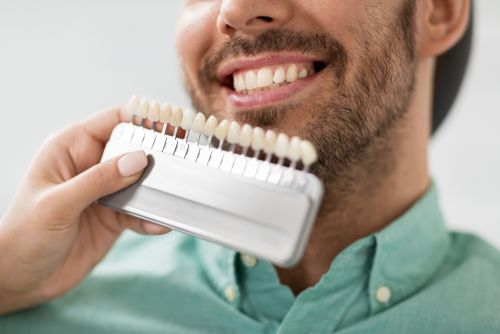Russ
PartnerView Profile
* Indicates a required field
Patients often seek dental veneers - svelte shells crafted from porcelain or composite resin - to transform smiles and correct dental imperfections such as chipped, discoloured, or misshapen teeth. However, as with any cosmetic procedure, veneers come with their own set of potential problems. Cosmetic Surgery Solicitors often helps those who have suffered from clinical negligence relating to cosmetic treatments, and veneers are no exception.
In the following blog post, we explore the considerations you should make before deciding to undergo the dental veneer procedure and what you may be able to do if you think you have been subject to dental negligence.

Having veneers properly installed is a process that involves several stages. These include an initial consultation, during which the patient's suitability for the procedure is evaluated, followed by the preparation of the teeth, which often entails the removal of a thin layer of tooth enamel, and finally, the bonding of the custom-made veneers to the patient's teeth.
At every stage, clear and open communication between the patient and dentist is crucial. The dentist must fully understand the patient's desires and expectations and the patient, in turn, must understand the process, potential results, and associated risks. Miscommunication or misunderstanding during any phase can lead to dissatisfaction and can potentially give rise to legal implications.
The risks of getting veneers may range from the medical, such as increased tooth sensitivity or gum disease, to the aesthetic, including poorly matched colour or ill-fitting veneers. Informed consent refers to the ethical and legal principle that mandates a patient's understanding and agreement to the potential risks, benefits, and alternatives of the procedure before it commences. By consenting to undergo the procedure, a patient accepts that there may be some side effects of the dental procedure, but this requires that the dental surgeon takes adequate steps to ensure that the patient is informed before they consent to anything.
When deciding to have veneers installed, patients can often decide between several different types. In the UK, these typically include:
It is also possible to get temporary veneers, but these do not come with as many of the permanent benefits and drawbacks as permanent options.
Tooth sensitivity: the process of veneer application often necessitates the removal of a thin layer of tooth enamel, which can leave teeth more vulnerable to temperature extremes, resulting in heightened sensitivity. A well-informed dental practitioner should always discuss this potential side effect with the patient, outlining preventative measures and management strategies to alleviate sensitivity.
Poor colour matching and aesthetic issues: poor colour matching can result in veneers that stand out starkly against the natural teeth, creating the opposite of the desired appearance which may negatively impact the patient's self-esteem. Choosing an experienced dentist with expertise in colour matching and aesthetic considerations is critical.
Problems with fit or bonding: veneers that do not adhere properly or fit well can cause discomfort, impact speech, and pose potential oral health issues. If the veneer application process isn't conducted with precision, the consequences can range from mild discomfort to severe pain, which might constitute clinical negligence.
Cracking or chipping: veneers, despite being relatively durable, are not completely invincible. They can chip or crack under certain conditions. Factors such as the patient's diet, oral habits, and the quality of the dental professional's work all play a role in preventing or causing such damage.
Over-contouring and under-contouring: these issues refer to the improper shaping of the veneers. Over-contoured veneers are too bulky, while under-contoured ones lack sufficient volume. Both can affect the patient's satisfaction and can lead to oral health issues.
The role of a reputable and experienced cosmetic dentist in preventing these common problems cannot be overstated. They possess the skills and knowledge necessary to perform the procedure with utmost care and precision.
During the healing process, veneer patients should make sure to take the following precautions:
In cases where a patient has suffered due to negligence related to their veneers, they might be eligible to make a claim. To be eligible to do so, a patient must fulfil several criteria:
Legal proceedings can be intimidating, but with our dedicated team at Cosmetic Surgery Solicitors, it need not be. We have a proven track record in representing patients who have faced complications from cosmetic procedures due to clinical negligence.
Understanding the potential problems with veneers and your legal rights as a patient is an essential part of considering this dental veneer treatment. It is essential that you conduct thorough research and consult trusted professionals before making any decisions. And, should you find yourself dealing with a veneer problem due to clinical negligence, contact Cosmetic Surgery Solicitors for expert legal guidance.
Call us today on 0808 291 1162, or fill out an online contact form and we will return your call at a time convenient for you.
Contact our team today by calling 0808 256 7148 or using our online contact form.
Whether you have questions about negligent cosmetic surgery or need assistance with your case, reach out to us today.